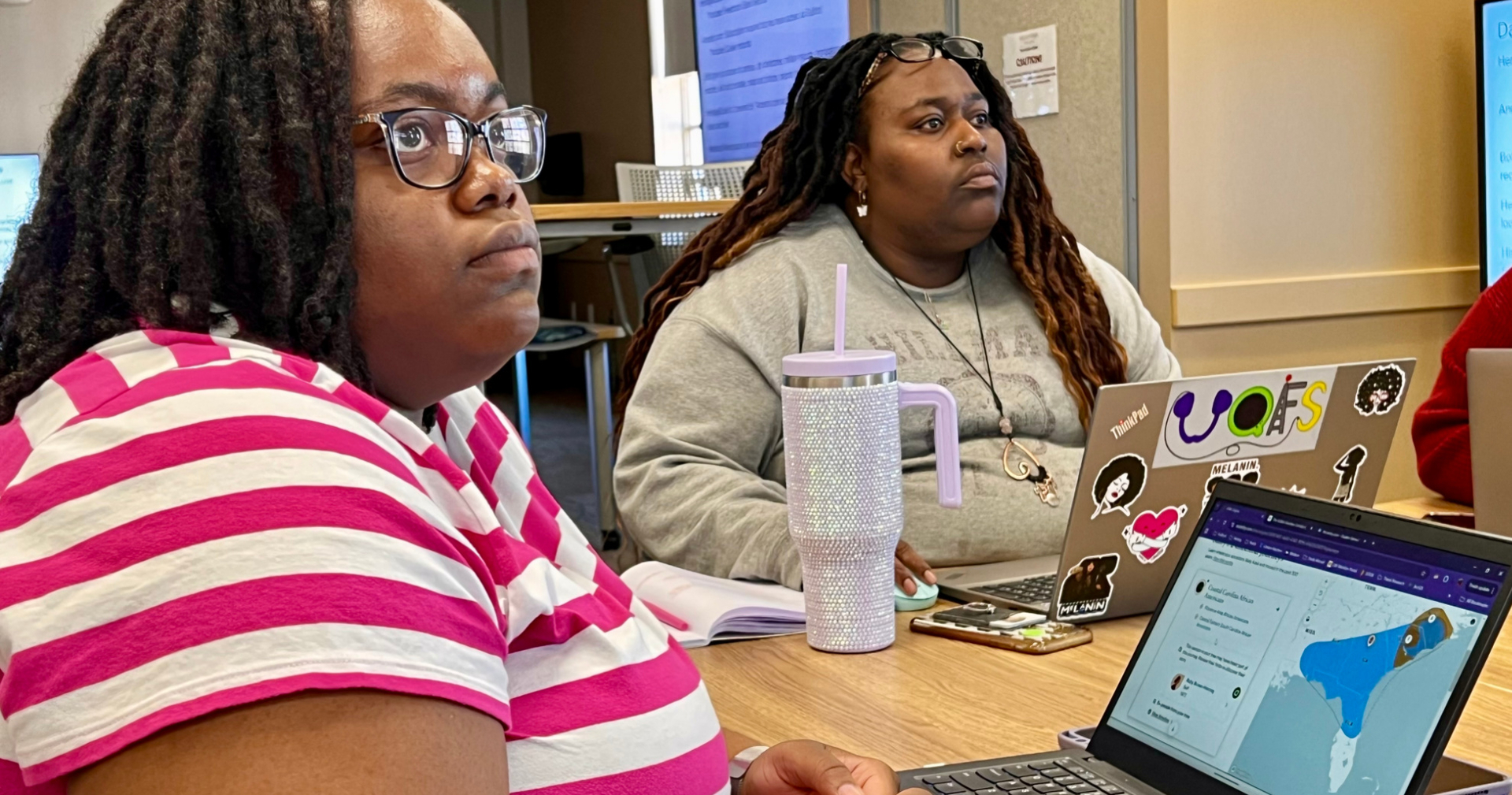
Tamryn Herring '25, left, and Janelle Morris took part in a geneology workshop sponsored by Guilford as part of Black History Month.
Students, faculty and staff curious about their family tree have access to a free online geneology service through the College.
“In an age where it seems our history is being erased, now’s the time for us to really take ownership of our own stories. We need to be doing our own digging to see what’s out there and find the truth.”
When faculty and staff were suggesting ways in January that Guilford might celebrate Black History Month, Janelle Morris knew exactly what she would propose.
Janelle is the College’s Associate Director of Career, Academic and Personal Exploration (CAPE). Her late twin sister Ja’lessa dutifully researched the family tree on her mother’s side. Janelle wants to do the same on her father’s side and present the findings to her family as a gift.
But Janelle says her interest in genealogy runs deeper than that. She says it’s timely for many Black people to learn about their heritage. “In an age where it seems our history is being erased, now’s the time for us to really take ownership of our own stories,” she says. “We need to be doing our own digging to see what’s out there and find the truth.”
A genealogy class at Guilford in the final week of Black History Month proved a good starting point for Janelle as well as other staff, faculty and students who attended.
“It was really interesting learning what tools are out there and how to use them,” says Janelle. “I’m ready to get started.”
Gwen Erickson, Quaker Archivist and Special Collections Librarian at the College, showed attendees how to use information online to start the process. In the same breath she warned people to exercise good judgement with records that are decades – sometimes more than a century – old.
Names were frequently misspelled on U.S. Census ledgers, says Gwen. Sometimes inaccurate information was purposely entered into public records. In some cases family members fudged birth dates so that children would appear to have been born after a marriage. Other times children’s fathers were listed as one person so the mother could avoid appearing promiscuous. “You just never know,” says Gwen. “The further back you dig the harder it can be to determine what’s accurate and what’s off.”
An exception to unreliable records might be with Quakers, who Gwen says were known for keeping accurate ones. In the 17th century, when Quakerism was being founded, they were non-conformists who were not part of the Church of England, says Gwen.
“To make their families legitimate, they were having to keep records of marriages, births and deaths,” says Gwen. “They were responsible for looking over the social welfare of their community so they were very careful in documenting membership. That means people who descended from Quakers kind of hit the motherlode with genealogy.”
An easy starting point is for Guilfordians to use ancestry.com through the College’s library portal. “Genealogical research of any kind takes an attention to detail, and Ancestry.com is just one tool among many to do that research,” she says.
Gwen says Guilford’s library provides electronic and print access to many North Carolina newspapers and the New York Times that could provide context as to why your family moved from one state to another in the 1880s.
“Maybe there was a drought or economic hardships or there’s the possibility there was persecution they were fleeing. “That’s where newspapers can help paint a more complete picture of your family’s past,” she says.
Tamryn Herring ’25 attended the workshop because she’s been curious about her family history for the last two years. She’s learned her ancestors lived and worked along the North Carolina and South Carolina coasts for generations and wants to know more.
“It’s been really cool to look at the history of North Carolina through the lens of my own family,” she said. “It’s going to be interesting to see what I find out.”

